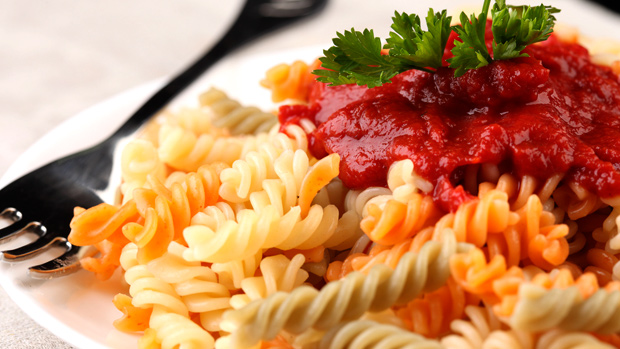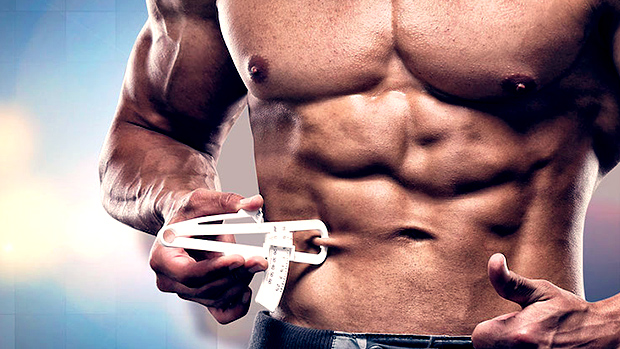Intermittent fasting, or IF, is the current rage in the health and fitness industry. But it's really nothing new, physiologically.
The ability to "fast," or go without food for extended periods of time lies within us all, a protective mechanism developed to help ensure the survival of our species when food supplies were low.
But fasting by choice, not to survive but to improve health and body composition, is a much newer phenomenon – unless you believe Paleoman would've turned up his nose to a freshly-killed mammoth so that he could fit into his skinny jeans by St. Patrick's Day.
Things have gotten really interesting lately, as bodybuilders have started to hop on the rapidly growing fasting bandwagon. For those committed to getting big and jacked, fasting seems ill advised to say the least.
Bodybuilding diets typically feature multiple meals spread throughout the day. This, the experts argue, not only manages hunger better, it keeps the metabolism "stoked" while not overloading the digestive system.
One of these multiple meal advocates has been Dr. John Berardi, but lately JB, as we like to call him, has had a change of heart. He's been checking fasting out, flirting with her, sending her texts, even rustled up the courage to ask her out on a date, just to see what all the fuss was about. And his results might surprise you.
T Nation: Fasting? JB, are you becoming one of those tree hugging vegans, too?
John Berardi: I know! A few years ago I would've thought the exact same thing when discussing fasting. However, that was based on my own blind fear and on misinformation.
I guess I figured that if most bodybuilders got big and strong by eating lots of food, frequently throughout the day, fasting would do the exact opposite. It would make my muscles shrink. And I'd get weaker.
Funny, it doesn't really work that way at all.
Now, there's some good science to back that up. However, published research has its limits. So I decided to put my own body to the test.
In my case, while experimenting with different types of intermittent fasting, I lost about 20 pounds of fat while preserving most of my lean mass. According to my Intelametrix device (a valid ultrasound-based form of body composition testing), I went from a fairly lean 10% body fat to a very lean 4%.
Here are some progress photos:


I also put a few of my clients to the test. One of them, a guy who wanted to gain weight instead of lose it, gained 20 pounds of quality lean mass in the last few months while also experimenting with intermittent fasting.
And as far as the vegan, tree hugging thing; quite the opposite. I eat more meat now than ever before. I'm up to three pounds a day on my low carb/high protein and fat days. (I eat a little less on my high carb/moderate protein/low fat days). That's just my maintenance plan.
T Nation: I want to dig into the details of your diet in a minute. But first, I've gotta ask. You've been a "six meal a day" musclehead for years. And you're always in shape. Why try this in the first place?
JB: Curiosity.
It's no secret that I'm a professional dieter. In other words, I've done nearlyevery diet or nutritional protocol that's around to test its efficacy.
Intermittent fasting has a very small, yet strong, following. And the research picture is starting to get intriguing. Honestly, the proposed benefits of IF in animals and humans read like a laundry list of "look better," "feel better," "live longer" physiological changes.
So I wanted to test it myself to see what kinds of physiological and psychological changes would come from it.
Also, I've been pursuing a new goal. In the last year I've been training with a professional track and field coach. I plan on competing in track and field (100m and 200m sprints) at the masters level.
When running competitively, every pound has got to earn its rent. So I wanted to test a new way to drop fat and get extremely lean, while staying strong and powerful.
In the end, I was able to do just that. As I said, I dropped a ton of fat while preserving my strength and lean mass. This, combined with my new training, has really improved my track performance.
T Nation: Let's talk about your plan. What exactly have you been doing?
JB: Well, I haven't been doing one plan so much as I've been experimenting with a host of different intermittent fasting ideas. In fact, during the last eight months I've played around with about eight different intermittent fasting protocols.
T Nation: Eight months of fasting? Sounds like fun...
JB: Haha, well it was definitely enlightening. I kept meticulous notes on everything from scale weight, body-fat percentage, and blood/hormonal markers, to lifestyle markers like energy levels, cognition, and a bunch of pain-in-the-ass factors.
Now, for those that aren't familiar with the concept of intermittent fasting, I'd like to start with a basic truth. No matter what eating style you follow, you already practice intermittent fasting.
Put in simple terms, if you typically eat dinner by 8 PM and breakfast at 8 AM the next day, you're fasting for 12 hours. So, you eat during the day and you fast during the night. Some refer to this as a 12/12 eating schedule because it's 12 hours of fasting and 12 hours of eating.
So, if your knee-jerk reaction is to say "no way!" to intermittent fasting, remember you're already doing intermittent fasting. Every day. And you're probably already enjoying some of the benefits.
However, there's some new research showing that a host of really powerful benefits may come into effect if we extend the fast even longer. Some suggest that we may even need to prolong the fast for 20-24 hours, depending on activity levels.
This last part is important. If you're fairly sedentary during the fast, you may need the full 20-24 hours without food to realize these benefits. However, if you're very active, or you exercise purposefully during the fasted state, you may be able to enjoy the same benefits after only 16-20 hours without food.
Despite lots of different theories about intermittent fasting on the web, the science is very preliminary. So, of course, there's no consensus on the best fasting/feeding interval. That's why I've been doing these experiments and testing just about everything.
T Nation: You keep mentioning benefits. What exactly are we talking about here? Some of the fasting zealots make it sound like if we stop eating we'll solve all our health and physique problems.
JB: I agree, the speculation is a little wild in the intermittent fasting communities right now. However, there's enough preliminary research support (in animal models, the human research is pretty limited) to suggest the following benefits:
- Reduced blood lipids (including decreased triglycerides and LDL cholesterol)
- Reduced blood pressure (perhaps through changes in sympathetic/parasympathetic activity)
- Reduced markers of inflammation (including CRP, IL-6, TNF, BDNF, and more)
- Reduced oxidative stress (using markers of protein, lipid, and DNA damage)
- Reduced risk of cancer (through a host of proposed mechanisms; we'll save them for another review)
- Increased cellular turnover and repair (called autophagocytosis)
- Increase fat burning (increase in fatty acid oxidation later in the fast)
- Increased growth hormone release later in the fast (hormonally mediated)
- Increased metabolic rate later in the fast (stimulated by epinephrine and norepinephrine release)
- Improved appetite control (perhaps through changes in PPY and ghrelin)
- Improved blood sugar control (by lowering blood glucose and increasing insulin sensitivity)
- Improved cardiovascular function (by offering protection against ischemic injury to the heart)
- Improved effectiveness of chemotherapy (by allowing for higher doses more frequently)
- Improved neurogenesis and neuronal plasticity (by offering protection against neurotoxins)
T Nation: That's pretty impressive. But what about muscle loss? I'd still be kind of afraid of what fasting that long would do to my muscle mass.
JB: Well, there's a trick. If you're going to play around with intermittent fasting, you have to do it right.
Just skipping meals or days of eating is likely a recipe for disaster from both a health and muscle/performance perspective. There are some good practices here and they pretty much include most of the "good nutrition" rules you already know about.
In the end, if you're afraid of muscle loss, I found that the following three types of fasting protocols have got you covered:
The trial fast: this is where I recommend people begin. Simply, you try it out once by going for 24 hours without food. I did my very first trial fast on a Sunday. I set it up by having a small meal on Saturday night at 10 PM, then I didn't eat again until another small meal on Sunday night at 10 PM. During the day on Sunday, I simply had 3 "non-meals" of water (1 liter), BCAA (5g), and a powdered fruit/veggie blend like Superfood.
The periodic fast: if the trial fast goes well, then you can play with this. Simply, you'll do the trial fast above more regularly, like once a month or once a week. I tried to do it twice a week and it went very, very badly. So remember, if some is good, more is not better.
The daily fast: This is a stricter, more advanced way of doing things. Here you extend your normal overnight fast, every day. Some people fast for 16 hours followed by an 8 hour feeding window. Others fast for 20 hours followed by a 4 hour feeding window. With both practices, you'd actually train fasted (at the very end of the fast) while taking 10-15g BCAA during the training. And eating some pretty large meals during your 4-8 hour feeding window.
In the end, all three forms of intermittent fasting are usually best reserved for fat loss or the maintenance of low body fat. However, I've had some success with clients using periodic fasting (once a week, maximum) to build muscle.
T Nation: You mentioned BCAAs. Do you think adding protein "pulses" to the fast, specifically high quality protein hydrolysates like Mag-10®, could help out in certain situations?
JB: You bet. You'll notice that with all three types of fasting, I used small amounts of BCAA to preserve muscle mass during the long fasts (24 hours). I also used BCAA during my training when fasting every day. Mag-10® could also be used here.
Regardless of whether you choose BCAA or Mag-10® or both, the most important thing is to get your amino acids, specifically your BCAA, and probably most importantly, leucine.
But that's not all you should consider.
At the end of the day, whether you're eating at regular intervals or fasting for longer periods, the basic rules of good nutrition still apply. In other words, what you eat (your food selection) and how much you eat (your food amount) are still very important.
So calorie balance still applies. Truly, there's no eating style that'll help you build muscle if you're grossly undereating. Likewise, there's no magic bullet for fat loss; a calorie deficit is always required to lose fat.
Let me give you an example to drive the point home. If I'm a guy that needs an average of 4,000 daily calories to grow, I'll need those calories whether I'm eating six meals a day or whether I'm eating two. And if I need to eat an average of 2,500 daily calories to lose fat, I'll need those 2,500 no matter how many meals I'm eating.
But instead of thinking about daily calorie intake, it's more helpful to think of weekly intake when talking about fasting. For example, if I need an average of 2,500 daily calories to lose fat, that's 17,500 calories per week. And this can be broken down all sorts of ways.
With the periodic fast, I could eat about 2,900 calories for six days of the week and 0 on the seventh. Or I could eat 3,500 calories for five days of the week and zero on the other two days.
And with the daily fast, instead of having six meals of around 400 calories each, I could have three meals of around 800 calories. Or I could have two meals of 1200 calories each.
These are just examples. I highly recommend not obsessing over your calorie totals like this. (Trust me, it's not necessary and could lead you down a road of OCD madness.)
But the examples serve to illustrate the point. If you're doing it right, the only difference between more traditional bodybuilding-style eating and intermittent fasting-style eating is how you distribute your calories between days or meals.
T Nation: What about post-workout nutrition?
JB: That still applies. As discussed above, you'd get your amino acids before/during training. And then you'd eat your biggest meal of the day after training.
Remember, IF doesn't throw nutritional best practices out the window. It simply rearranges the normal feeding/fasting windows each day.
T Nation: So, have you completely abandoned the six meal-a-day thing?
JB: Hell no!
As someone who's averaged four to seven meals per day for nearly 20 years, I'll admit that I was skeptical at first when looking at this intermittent fasting stuff. After all, the grazing concept has not only served me well, it's helped over 100,000 of my own clients and readers (and millions of people worldwide) get into better shape.
Ignoring all the evidence and experience I have with grazing and higher meal frequency diets would be an absurd overreaction.
So, no, I haven't abandoned the grazing concept, I've simply made room for another idea. The idea that we don't have to graze. It's not a must. Rather, in most cases, it's a choice.
For most people, as long as we eat the right foods in the right amounts, meal frequency is a matter of personal preference. You can eat lots of small meals. You can eat a few big meals. You can even go an entire day without eating once in a while. It's all about what works best for your schedule, your appetite, and how you prefer to spend your time.
I've found that some people absolutely love to eat big meals and can better control their daily appetite when eating this way. For them, intermittent fasting allows them to do that while trying to lose fat or gain muscle.
Others love to eat smaller meals and, for them, this better controls their daily appetite. In this case, the grazing concept works better.
I've worked with hundreds of thousands of clients. They're not all the same. Different people and different situations require different approaches. And I'm open to them all as long as they get the results we're after.
IF is a helpful tool and one I'll continue to use periodically. But it's not the end-all, be-all of nutrition or fitness. People have been getting and staying in awesome shape for decades without the use of intermittent fasting.
T Nation: It sounds like you think both IF and conventional dieting can have a place in someone's fat loss plan. Do you think one is better than the other?
JB: Yep, I do. The best one is the one that each individual dieter will stick with. And the only way to find out which that is, is by experimenting with both.
In my experience, I don't think IF is objectively better for losing body fat. After all, I've been this lean before and I've done it with more conventional dieting.
However, once I got really lean, IF seemed to make it easier for me to maintain this very low body fat percentage. Now, to say IF is easy would be a flat-out lie. It's not. But, like I said, it may make it easier to maintain a low body weight and very low body fat percentage in the long run.
This last advantage shouldn't be overlooked. Most people that want to get ripped end up doing a crash bodybuilding-style diet, only to rebound back to their original weight very quickly. I can't tell you how many times I've done that.
But with my IF experiments, I've been able to maintain my 20-pound weight loss (my body fat testing device still reads me at between 4% and 5%) for five months. That's pretty good, for me anyway. And I've even been able to play around with a few hybrid ideas where I use fasting some days and more frequent eating others.
T Nation: What about muscle gain? You mentioned a client who gained 20 pounds while using IF. What was he doing?
JB: Well, this is another experiment we're working on. And you'll likely hear more about it in the near future as this guy is pretty high-profile in the fitness and strength world.
Anyway, he's doing a radical mass gain program that's also designed to improve his aerobic and anaerobic conditioning. And we're measuring everything so we can see just how effective the program is.
Now the training is beyond the scope of this interview, but I can tell you this: he's training his ass off, and in terms of his diet, we're doing some calorie and carb cycling along with one weekly 24 hour fast.
On his three weight training days, he eats 3-4 super-high calorie, high carb meals. On his three conditioning days, he eats 3-4 more moderate calorie, moderate carb meals. And on his one fasting day, he follows the periodic fast protocol above.
So far he's gained 20 pounds of lean mass in a very short period of time, with more gains to come.
T Nation: 20 pounds of lean mass! Impressive! So is this style of eating suitable for competitive bodybuilders?
JB: It depends on a lot of factors, including body type, training style and personal meal preference. You don't just throw intermittent fasting into the mix without considering everything. The program has to represent an internally consistent system. The parts all have to fit together. If they don't, it's not going to work.
Generally speaking, however, I think periodic fasting (at most, once per week) could easily be included in an offseason bodybuilder's schedule and would lend some unique benefits as long as the athlete ate more on the other six days of the week.
When dieting, I think a host of different fasting approaches could be used as well. Again, weekly calorie intake would have to be established correctly. If it is, I think the periodic fast could work, as could the daily fast.
Of course, you don't have to use IF at all. Most successful bodybuilders don't. And, to be honest, I prefer IF for guys who are simply interested in being lean and muscular for life, without the weight swings of the average competitive bodybuilder.
T Nation: I'm wondering if you or your subjects experienced any negative side effects during the experiments?
JB: Sorta. Nothing health or physique related, but I should mention how absolutely miserable the transition period was for the 16/8 fasting experiment.
The periodic (one-day) fast isn't so bad. Yes, you'll feel hunger at times. No, it's not easy to deal with if you've never pushed through hunger before. But it's only a day. And you can deal with any sort of misery for only one day, especially if you prepare for it.
Plus, it gets markedly easier each time. So, when experimenting with the weekly fasts, everyone agrees that after the first one or two times, it's pretty easy as long as you plan for it.
However, the first two weeks of the 16/8 fast were brutal. First of all, because my eating window was from 1 PM to 9 PM, I was skipping breakfast. And I really missed breakfast, both physiologically and psychologically.
Massive stomach rumblings. Hunger cravings. Low mental focus until my first meal. And big-time morning moodiness. I did my best to stave off the breakfast cravings with a few cups of green tea or coffee, which helped. But I still felt really bad.
Also, I was cranky and unfocused from my wake-up time of 8 AM until my workout at noon. I was mentally sluggish. Sometimes when speaking to my wife or a member of my team, I spoke so slowly that they must've thought I had a stroke overnight. Of course, this affected my relationships and my work. I started ignoring my family until after my first meal. I never scheduled meetings before 1 PM.
Finally, I should also note that for the first 10-14 days I was much quicker to anger than usual. Comments or situations that I'd have been able to let slide just a few weeks earlier led me down an unhealthy path of smart-ass retorts or bubbling rage. It got to the point that I didn't even like being around myself.
Luckily, I told my friends and family what was going on, and they're a pretty understanding bunch. Also, I had some practice in the art of mindful interaction and self-soothing from the one-day fasts.
Anyone who's ever transitioned to a low-carb diet probably recognizes these symptoms. They also know that they usually only last two weeks or so. So I stuck it out. As expected, something magic happened after 10-14 days on the plan. Everything got better.
I pretty much stopped thinking about breakfast altogether by the 10-day mark. By 12 days, my moodiness was in check. And by 14 days, I was productive again.
So, if you try this, be careful and make sure you know what you're getting into.
T Nation: In general it sounds like you use IF cautiously. Are there some people who shouldn't try it?
JB: I think anyone and everyone should attempt the trial fast. You can learn a lot about yourself when you go without food for a full day. Plus, you learn to manage hunger. And that's something everyone interested in physique improvement needs to learn to manage.
However, for the more regular or more extreme forms of fasting, I've found they're more successful when:
- You have a history of monitoring calorie and food intake (i.e. you've "dieted" before)
- You're already an experienced exerciser
- You're single or you don't have children
- Your partner (if you have one) is extremely supportive, and
- Your job allows you to have periods of low performance while you adapt to a new plan.
On the other hand, these programs seem to be much more challenging for those who:
- Are new to diet and exercise
- Are married and have children
- Have performance oriented or client-facing jobs, and
- Compete in sport/athletics.
Also, stress is stress. If you've got a new job, are moving, or have any other major life changes coming up, it's probably not a great time to try something like intermittent fasting.
Finally, for pregnant women, people who have or have suffered from disordered eating, and people simply looking to be healthy and fit with no particular desire to be extremely lean, there's absolutely no reason to try the more extreme IF varieties.
Honestly, there are far easier ways to make rapid and lasting changes for people who just want to look and feel better.
T Nation: Like what?
JB: Doing the basics.
Things like eating good quality food, eating slowly, eating reasonable portions, eating when you're hungry, and not eating when you're not. It also wouldn't hurt to learn how to prepare healthy food in the first place.
Those things are enough for most people to get in the best shape of their lives. I know, because my team and I have helped thousands of clients get there. None of them did any more than the trial fast, but all of them are taught those essentials.
Of course, if you've got those essentials down (and don't kid yourself here), then IF may offer a few unique benefits.
First, it's a great way to intentionally practice being hungry. The better you can manage hunger, the less likely you are to react compulsively to it. To get fit – and stay fit – you need that skill.
Second, it's a lesson in disguise for people who care about their health and fitness:relax. So you missed a meal. Who cares? Might even be good for you. Just keep going.
Third, it's great as an advanced strategy for maintaining extreme leanness. If you want that, and you're prepared, you may find this protocol easier to follow than the typical bodybuilding-style diets. I did.
But ultimately, fasting is a "nice-to-have." It's unnecessary to get in shape, and alone it's insufficient.
T Nation: Awesome JB. Thanks for the interview.





